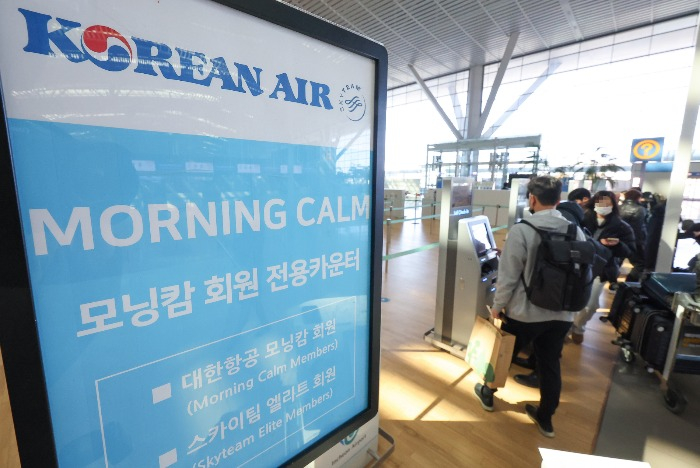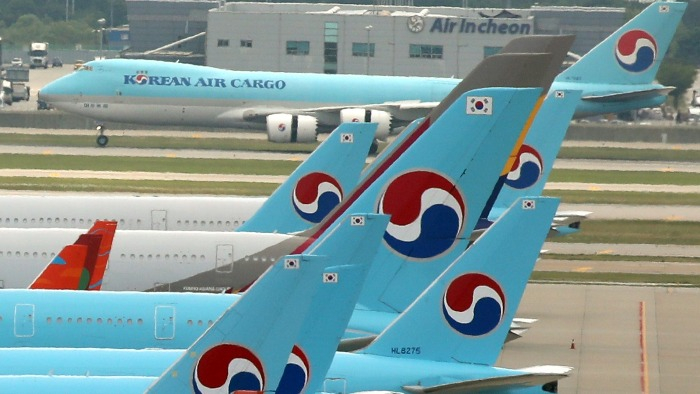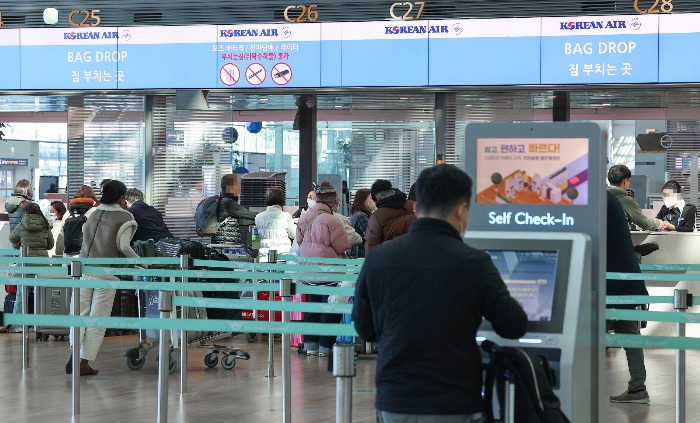Airlines
Lessons from Korean Air’s botched mileage program reform
The airline's plan to revamp its mileage system came after it posted record earnings and drew strong criticism
By Feb 21, 2023 (Gmt+09:00)
3
Min read
Most Read
LG Chem to sell water filter business to Glenwood PE for $692 million


Kyobo Life poised to buy Japan’s SBI Group-owned savings bank


KT&G eyes overseas M&A after rejecting activist fund's offer


StockX in merger talks with Naver’s online reseller Kream


Mirae Asset to be named Korea Post’s core real estate fund operator



Korean Air Lines Co. has suspended a plan to revamp its mileage program after it drew harsh criticism from both its customers and government officials.
The flagship carrier had sought to introduce a new Skypass reward program from April 1, under which it would offer miles based on travel distance instead of region.
It also tried to split the group of international mileage service users into 10 brackets and apply different rates for earning miles.
Currently, its mileage for international flights is based on region. Regions include North Asia, North America and Oceania.
The reform plan was seen as aimed at cutting its heavy mileage liabilities, or unused miles, amounting to 2.7 trillion won ($2.1 billion), according to industry watchers.
But the proposed mileage system reform has met with strong resistance.
It also might not be the right timing to reaffirm the mileage system revision, initially announced in December 2019 before COVID-19 struck.
In a Feb. 16 Facebook post, Minister of Land, Infrastructure and Transport Won Hee-ryong hit out at the airline, saying the proposed revision to its mileage system would undermine the value of the miles earned by its customers.
"It seems like neglecting the interests of customers, after posting record earnings,” Won said in the post.
“The revision is ‘all spin and no substance.’ As a minister in charge of the aviation industry, it would be hard to agree to this plan."
Last year, Korean Air posted its largest-ever revenue and operating profit, which jumped by double digits. It is also preparing to complete the 1.8-trillion-won purchase of a majority stake in smaller local rival Asiana Airlines Inc., which is set to create the world’s No. 7 carrier.

Korean Air’s mileage reform was supposed to take effect in April 2021, but it was postponed due to the pandemic.
The carrier has insisted the revised mileage program would benefit its passengers, rather than listening to customers’ complaints.
The ruling People Power Party recently noted that the new mileage system was designed to cut the benefits for long-haul travelers and would require its passengers to travel more to earn as many miles as before.
As an example, a Korean Air business class reward ticket from Incheon, South Korea to New York will require 90,000 miles under the new system, compared to the current 62,500 miles.
Miles earned for shorter routes will be curtailed as well, according to the ruling party.
But Korean Air refuted this and said that under the new mileage program, more miles would be earned for short- and medium-haul flights.

MILEAGE LIABILITIES
Korean Air's mileage liabilities stood at 2.7 trillion won ($2.1 billion) as of end-September, 2022, compared to 1.1 trillion won at the end of 2010. They are booked as liabilities in its financial statements.
As of December 2019, its debt-to-equity ratio came in at 814%.
In an effort to shave off unused miles, Korean Air has encouraged its customers to burn their miles at offline and online shopping malls through its partnerships with companies such as E-Mart and Naver Corp.
According to Korean Air, about 90% of its mileage service subscribers hold an average of 30,000 miles or less.
Among them, only four percent are estimated to have 70,000 accrued miles or more on average, enough to be redeemed for an economy class bonus ticket for a long-haul flight.
Above all, overhauling the airline's mileage program could frustrate its loyal customers, particularly those in their 20s to 40s. They frequent a limited number of retail shops in partnership with Korean Air to earn miles.
To ease their frustration, Korean Air suggested it increase the number of reward seats and raise the current 5% limit of bonus tickets among total flight seats.
Their proposal was rejected by the government, however. Last week, the ruling party called for Korean Air to review its mileage program reform.
In 2022, the airline's operating profit skyrocketed 97% on-year to a record 2.9 trillion won on a standalone basis, with sales up 53% to 13.4 trillion won.
Write to Kyung-Min Kang at kkm1026@hankyung.com
Yeonhee Kim edited this article
More to Read
-

-
 Korean chipmakersSamsung in talks to supply customized HBM4 to Nvidia, Broadcom, Google
Korean chipmakersSamsung in talks to supply customized HBM4 to Nvidia, Broadcom, Google24 HOURS AGO
-
 EnergyLS Cable breaks ground on $681 mn underwater cable plant in Chesapeake
EnergyLS Cable breaks ground on $681 mn underwater cable plant in ChesapeakeApr 29, 2025 (Gmt+09:00)
-
 Business & PoliticsUS tariffs add risk premium to dollar assets: Maurice Obstfeld
Business & PoliticsUS tariffs add risk premium to dollar assets: Maurice ObstfeldApr 29, 2025 (Gmt+09:00)
-

Comment 0
LOG IN


